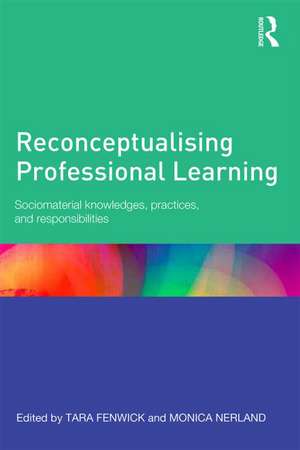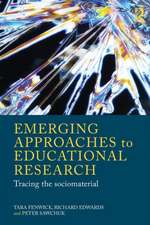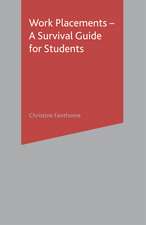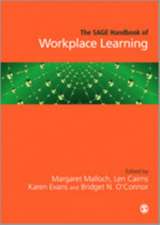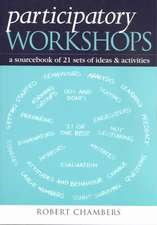Reconceptualising Professional Learning: Sociomaterial knowledges, practices and responsibilities
Editat de Tara Fenwick, Monika Nerlanden Limba Engleză Paperback – 6 mar 2014
- more practitioners become involved in interprofessional collaboration
- developments in new technologies and virtual workworlds
- emergence of transnational knowledge cultures and interrelated circuits of knowledge.
Exploring what the authors call sociomaterial perspectives on professional learning they argue that theories that trace not just the social but also the material aspects of practice – such as tools, technologies, texts but also bodies and actions - are useful for coming to terms with the challenges described above.
Reconceptualising Professional Learning develops these issues through specific contemporary cases focused on one of the book’s three main themes: (1) professionals’ knowing in practice, (2) professionals’ work arrangements and technologies, or (3) professional responsibility. Each chapter draws upon innovative theory to highlight the sociomaterial webs through which professional learning may be reconceptualised. Authors are based in Australia, Canada, Italy, Norway, Sweden, and the USA as well as the UK and their cases are based in a range of professional settings including medicine, teaching, nursing, engineering, social services, the creative industries, and more.
By presenting detailed accounts of these themes from a sociomaterial perspective, the book opens new questions and methodological approaches. These can help make more visible what is often invisible in today’s messy dynamics of professional learning, and point to new ways of configuring educational support and policy for professionals.
| Toate formatele și edițiile | Preț | Express |
|---|---|---|
| Paperback (1) | 428.38 lei 6-8 săpt. | |
| Taylor & Francis – 6 mar 2014 | 428.38 lei 6-8 săpt. | |
| Hardback (1) | 1001.07 lei 6-8 săpt. | |
| Taylor & Francis – 14 mar 2014 | 1001.07 lei 6-8 săpt. |
Preț: 428.38 lei
Nou
Puncte Express: 643
Preț estimativ în valută:
81.98€ • 85.27$ • 67.68£
81.98€ • 85.27$ • 67.68£
Carte tipărită la comandă
Livrare economică 15-29 aprilie
Preluare comenzi: 021 569.72.76
Specificații
ISBN-13: 9780415815789
ISBN-10: 0415815789
Pagini: 246
Ilustrații: 1 black & white tables
Dimensiuni: 156 x 234 x 10 mm
Greutate: 0.12 kg
Ediția:1
Editura: Taylor & Francis
Colecția Routledge
Locul publicării:Oxford, United Kingdom
ISBN-10: 0415815789
Pagini: 246
Ilustrații: 1 black & white tables
Dimensiuni: 156 x 234 x 10 mm
Greutate: 0.12 kg
Ediția:1
Editura: Taylor & Francis
Colecția Routledge
Locul publicării:Oxford, United Kingdom
Public țintă
Postgraduate and ProfessionalCuprins
Professional knowing, work arrangements and responsibility: new times, new concepts?
Tara Fenwick, University of Stirling and Monika Nerland, University of Oslo
Section1: Reconceptualising Professional Knowing
Tara Fenwick, University of Stirling and Monika Nerland, University of Oslo
Section1: Reconceptualising Professional Knowing
- Professional knowing-in-practice: rethinking materiality and border resources in telemedicineSilvia Gherardi, University of Trento, Italy
- Learning through epistemic practices in professional work: examples from nursing and engineeringMonika Nerland and Karen Jensen, University of Oslo, Norway
- The doctor and the blue form: learning professional responsibilityMiriam Zukas, Birkbeck, University of London and
Sue Kilminster, Leeds Medical Education Institute, University of Leeds - Re-thinking teacher professional learning: a more than representational accountDianne Mulcahy, University of Melbourne, Australia
- Surfacing the multiple: diffractive methods for rethinking professional practice and knowledgeDavide Nicolini and Bridget Roe, Warwick University, UK
Section II: Reconceptualising Professional Work Arrangements - Nurturing occupational expertise in the contemporary workplace: an ‘apprenticeship turn’ in professional learningAlison Fuller, University of Southampton
Lorna Unwin, Institute of Education, UK - A technology shift and its challenges to professional conduct: mediated vision in endodonticsÅsa Mäkitalo, University of Gotenburg, Sweden
Claes Reit - Engineering knowing in the digital workplace: aligning sociality and materiality in practiceAditya Johri, Virginia Tech University, USA
- Interprofessional working and learning: a conceptualization of their relationship and its implications for educationDavid Guile, Institute of Education, UK
- Arrangements of co-production in healthcare: partnership modes of interprofessional practiceRoger Dunston, University of Technology at Sydney, Australia
Section III: Reconceptualising Professional Responsibility - Materiality and professional responsibilityTara Fenwick, University of Stirling, UK
- Developing professional responsibility in medicine: a sociomaterial curriculumNick Hopwood, University of Technology at Sydney, Australia
Madeleine Abrandt Dahlgren, Linköping University, Sweden
Karin Siwe, Linköping University, Sweden - Dilemmas of responsibility for health professionals in independent practiceSarah Wall, University of Alberta, Canada
- Putting time to ‘good’ use in educational work: a question of responsibilityHelen Colley, Huddersfield University, UK
Lea Henriksson, University of Tampere, Finland
Beatrix Niemeyer, University of Flensburg, Germany
Terri Seddon, Monash University, Australia - Professional learning for planetary sustainability: ‘thinking through country’
Notă biografică
Tara Fenwick is Professor of Education at the University of Stirling, UK and director of ProPEL, an international network for research in professional practice, education and learning.. Her most recent book is Emerging Approaches to Educational Research: tracing the sociomaterial, with R. Edwards and P. Sawchuk (Routledge 2012).
Monika Nerland is Professor of Education at the University of Oslo, Norway. She has led several research projects focusing on leraning and knowledge development in different professions. She recently co-edited the book Professional Learning in the Knowledge Society, with K. Jensen and L.C. Lahn (Sense 2012).
Monika Nerland is Professor of Education at the University of Oslo, Norway. She has led several research projects focusing on leraning and knowledge development in different professions. She recently co-edited the book Professional Learning in the Knowledge Society, with K. Jensen and L.C. Lahn (Sense 2012).
Descriere
This book presents leading-edge perspectives and methodologies to address emerging issues of concern for professional learning in contemporary society. The conditions for professional practice and learning are changing dramatically in the wake of globalization, new modes of knowledge production, new regulatory regimes, and increased economic-political pressures. In the wake of this, a number of challenges for learning emerge:
By presenting detailed accounts of these themes from a sociomaterial perspective, the book opens new questions and methodological approaches. These can help make more visible what is often invisible in today’s messy dynamics of professional learning, and point to new ways of configuring educational support and policy for professionals.
- more practitioners become involved in interprofessional collaboration
- developments in new technologies and virtual workworlds
- emergence of transnational knowledge cultures and interrelated circuits of knowledge.
By presenting detailed accounts of these themes from a sociomaterial perspective, the book opens new questions and methodological approaches. These can help make more visible what is often invisible in today’s messy dynamics of professional learning, and point to new ways of configuring educational support and policy for professionals.
